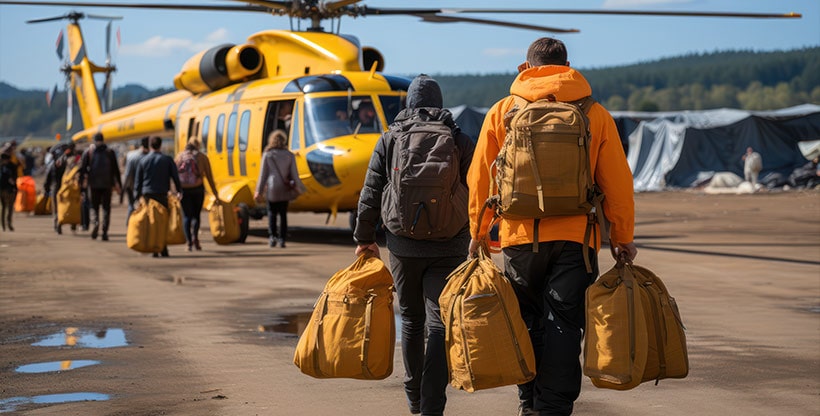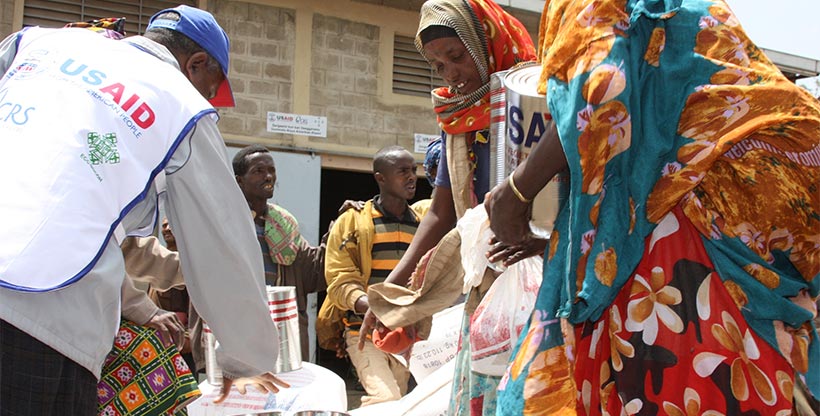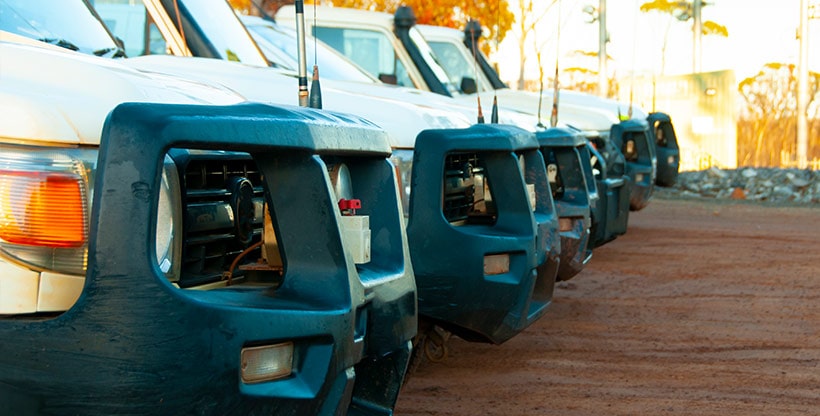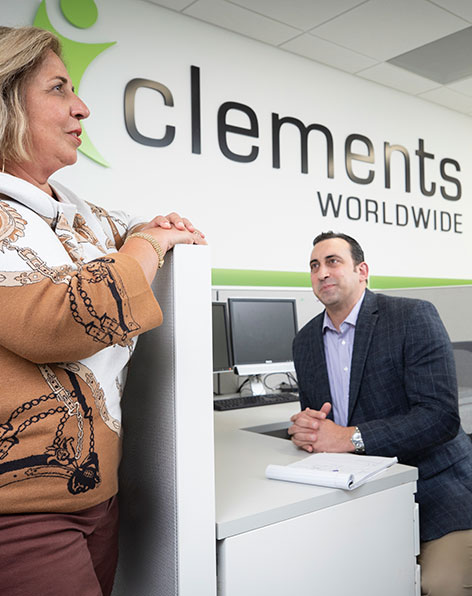Organizations
Minimizing Risk, Maximizing Impact: Critical Insurance Coverages for NGOs

When you’re running an international nonprofit or NGO of any size, the nonprofit insurance coverage you choose can greatly impact the safety of your team anywhere in the world. Proper coverage not only enhances your employees’ confidence when it comes to safely working abroad but can ensure your assets, such as cars, premises, and equipment are protected.
So how do you know what risks your organization may face? How do you decide what type of insurance your nonprofit should get to properly protect your staff and assets? If you’re wondering about these things or just want to cross check to verify that you are completely protected, this article is for you.
In This Guide:
- Common Types of Risks NGOs Face
- Why NGOs Need Insurance
- Types of Coverages NGOs Have
- Consultation with Experts
- NGO Complete insurance package
The Most Common Types of Risks NGOs Face
International NGOs operate in challenging environments where unanticipated events can significantly disrupt their operations. They face unique types of risks, including but not limited to.
- Security Risks: NGOs operating in volatile regions may face risks such as political unrest, civil conflict, terrorism, and kidnappings. These can have significant impact on an NGO and its ongoing ability to remain operationally effective.
- Operational Risks: These include risks related to logistics, transportation, infrastructure, and supply chain disruptions that can impact the delivery of aid or services. Often a failure in logistics can signal the end of a particular initiative and leave the NGO with considerable costs.
- Legal and Regulatory Risks: NGOs may face challenges related to compliance with local laws and regulations, including restrictions on foreign funding, registration requirements, and changing legal environments.
- Financial Risks: NGOs rely on funding from donors, and fluctuations in funding availability, changes in donor priorities, or economic instability can pose financial risks to their operations.
- Reputation Risks: NGOs may face reputational damage due to allegations of misconduct, mismanagement, or failure to meet program objectives, which can impact their credibility and ability to attract support.
- Physical Assets Risks: NGO’s can have several different assets they need to make sure are protected including, buildings, property, stocks and vehicle amongst other risks. Risks of fire, theft and damage are important risks to consider should the NGO suffer a loss of their assets.
Why Do NGOs Need Insurance?
NGOs need good insurance when operating internationally to help ensure the success of their mission, the safety of their staff, or to align with locally applicable laws.
Some key reasons are:
- Risk Mitigation: Operating in foreign and often challenging environments exposes NGOs to various risks, including security threats, natural disasters, political instability, and legal complexities. Good insurance coverage helps mitigate these risks by providing financial protection and support in case of unexpected events or emergencies.
- Duty of Care: NGOs have a duty of care towards their employees, volunteers, and the populations they serve. Adequate insurance coverage ensures that necessary medical assistance, emergency evacuations, or repatriation can be provided if individuals are injured, fall ill, or face security threats while working abroad.
- Attract and Retain Employees: While salaries are important, organizations with tailored benefits see higher retention rates. Robust insurance packages are among the key strategies in successful NGO recruitment plans.
- Protection of Assets: NGOs invest significant resources in assets such as vehicles, equipment, supplies, and infrastructure. Insurance coverage safeguards these assets against loss, damage, theft, or destruction, ensuring that the organization’s operations can continue without major disruptions.
- Legal Compliance: Many countries have specific legal and regulatory requirements for NGOs operating within their borders. Insurance coverage, such as liability insurance, helps NGOs meet these obligations and ensures compliance with local laws and regulations.
- Donor and Partner Confidence: Donors and partner organizations often require NGOs to have adequate insurance coverage as part of their due diligence process. Demonstrating comprehensive insurance coverage enhances the confidence and trust of stakeholders, which can lead to increased funding opportunities and partnerships.
- Reputation Protection: NGOs’ reputation is vital for maintaining public trust, attracting donors, and securing partnerships. Good insurance coverage helps protect the organization’s reputation by addressing potential liabilities, mitigating risks, and providing a robust response to unexpected situations.
- Financial Stability: Unexpected events or emergencies can result in significant financial burdens for NGOs. Insurance coverage provides a safety net by covering costs associated with risks and minimizing the financial impact on the organization’s budget and resources.
- Peace of Mind: Operating in complex and dynamic international environments can be stressful for NGO staff and volunteers. Having comprehensive insurance coverage offers peace of mind, knowing that they are protected and supported in case of unforeseen circumstances.
Types of Coverage NGOs Should Consider
International NGOs experience unique risks compared to other organizations. A thoughtfully tailored international insurance safeguards NGOs against unforeseen risks and financial burdens. This safety net allows NGOs to focus on their core mission of helping underserved communities without the constant worry of financial setbacks.

Safety and Security
- Kidnap and Ransom Insurance: This coverage provides protection in high-risk environments, covering expenses related to security evacuations, ransom negotiations, and crisis response in case of kidnappings or extortions. An increasingly necessary coverage due to the growing number of incidents seen in high-risk locations around the world.
The International NGO Safety Organisation (INSO) published in August 2022 that they had recorded:
“416 abduction incidents involving non-governmental organizations (NGOs) from January 2018 to June 2022. In total, these incidents affected 747 aid workers. There were 219 incidents where those involved were confined for questioning, as well as 97 kidnappings involving ransoms or other demands and 100 unresolved cases.”
- Political Risk, Violence, War, and Terrorism Insurance: According to the Global Terrorism Index 2022, there were 5,226 terrorist attacks in 2021, a 17% increase from the previous year. These attacks affect both ordinary citizens and international employees of different organizations.
Political upheaval and attendant consequences, such as looting and riots, impact nonprofits operating in unstable societies. Political, risk, violence, war, and terrorism insurance policy can protect your staff from the adverse effects of such events whenever they occur.
Property and Assets
This coverage protects NGO-owned or leased property, equipment, vehicles, and supplies against loss or damage caused by events such as natural disasters, accidents, or theft. Let’s look at some key coverages and how they help protect NGOs globally:

- Vehicle Fleet: International roads are not always easily navigable. Dangerous road conditions and poor infrastructure can cause damage to vehicles in day-to-day use. In some parts of world, carjacking and theft are everyday risks. You require an auto fleet policy to protect any vehicles your NGO owns from auto liability and physical damage.
- Commercial Property: This policy covers replacement costs for your property, and you can often customize your plan to include building, business personal property, stocks, computer and data storage, or loss of business income.
Liabilities
There are a wide variety of liability insurance coverages available to NGOs. The key ones your NGO should consider include:
- General Liability: Provides protection to businesses and organizations against claims of bodily injury, property damage, personal injury, or advertising injury caused to third parties. It covers the legal costs, settlements, or judgments arising from these claims.
- Professional Liability: Also known as Errors and Omissions (E&O) insurance, this coverage is designed to protect professionals against claims of negligence, errors, or omissions in their professional work. It provides financial protection in case a client alleges that the professional’s services or advice caused them financial losses or harm.
- Directors & Officers (D&O): This insurance is for nonprofit leaders and takes into account their specific risks separate from those all employees face, including mismanagement and misuse. It covers the costs associated with legal defense, settlements, or judgments in lawsuits brought against directors and officers for alleged wrongful acts committed in their roles. These wrongful acts may include breaches of fiduciary duty, negligence, errors in judgment, mismanagement, or violations of laws or regulations.
- Cyber Liability: Coverage designed to protect your organization from financial losses and liabilities associated with cyberattacks and data breaches. It provides coverage for various expenses incurred in the aftermath of a cyber incident, including legal fees, investigation costs, notification expenses, credit monitoring services for affected individuals, public relations efforts, and potential financial settlements.
- Product Liability: To diversify their income streams, some nonprofits sell products such as T-shirts and mugs, among other items. If your entity sells any products to raise funds, you should consider taking product liability insurance. This coverage shields your organization from claims brought by customers who allege harm caused by your goods.
Employee Protection
Often the most important part of your business are the employees – they’re the ones who put in their effort and time to provide aid and help others, even though it sometimes means risking their own safety working in high-risk areas or even war zones. So it is vital that you ensure their safety as best you can. Some of the most common employee benefit coverages for NGOs include:
- Personal Accident: Provides financial support in case of injury, with lost wages and medical expenses being covered. If the accident is more serious and results in a loss of life, financial support is in the form of a lump sum death benefit. Should an employee get injured due to an accident, disability coverage can pay out weekly wages for up to 52 weeks (about 12 months) while they recover.
- Travel Accident: Provides additional protection for employees or volunteers traveling on behalf of the NGO, including medical expenses, emergency medical evacuation, trip cancellation, or lost baggage.
- Group Medical: Providing access to medical care either in country, or across borders to help ensure the wellbeing of staff and their families. Look for policy options that can be tailored to you NGOs specific needs.
- Life Insurance: Especially essential for employees working in a dangerous environment. Group life insurance can be tailored to ensure high coverage limits, alleviate financial burdens, and help families through grief. Offering this protection to your staff can help you attract and retain the best employees for your global operations.
Specialized Coverage
In addition, depending on the nature of their work, NGOs may need specialized coverage such as
- Event cancellation insurance
- Cargo insurance for transporting goods
- Pollution liability insurance for environmental projects
Speak to the Experts
In summary, reliable insurance coverage is essential for international NGOs to manage risks, protect their assets, fulfill their duty of care, comply with regulations, maintain stakeholder confidence, preserve their reputation, ensure financial stability, and provide peace of mind to their personnel. It is a crucial component of responsible and sustainable operations in the international NGO sector.
If you wish to explore any of the above coverages in more detail, or discuss additional insurance options, speak with an international insurance specialist like Clements Worldwide who has experience working with NGOs in challenging environments globally.
We hope you found this guide informative and helpful for your organization.
Contact Us for a Free Consultation
If you have any questions, insurance needs, and wish to speak with us directly, please contact us by filling out this short online form or at ngo@clements.com and will be happy to arrange a free consultation.
Learn more: International Insurance for NGOs and Nonprofit organizations
NGO Complete
International Insurance Package for Small to Mid-Size Nonprofits and NGOs
All your missions are protected with one solution. Have peace of mind with comprehensive international insurance coverage in a single, streamlined NGO Complete package. We’ve worked extensively with NGOs, and designed this package for the unique risks and needs of NGOs with up to 250 local national, and expat staff and 250k to $15M annual revenue.
Get a free consultation and see how NGO Complete can empower your small to mid-size international organization:

About Clements
Clements Worldwide specializes in understanding the unique risks faced by NGOs and tailors global insurance solutions to effectively mitigate those risks. Whether your NGO operates in high-risk countries or conflict zones, Clements Worldwide can provide the flexible protection you need to operate with confidence.
Clements is a trusted provider of international insurance for expats, diplomats, and organizations in over 170 countries. Since 1947, we have enabled millions of people and organizations to live and operate anywhere in the world.
Our relentless commitment to customer experience and expertise in crafting tailored insurance solutions enables us to serve individuals, corporations, government agencies, international schools, nonprofits, and NGOs with global aspirations. Headquartered in Washington, DC, Clements has a worldwide presence with other locations in London, Dublin, and Gibraltar.
Relevant Helpful Resources
Find tips, trends, and perspectives to help you confidently make decisions and navigate challenges internationally with peace of mind. Read how you can live, operate, and manage risks abroad.
The Need for Specialized Insurance: Why Mass Market Insurance Falls Short for High Net Worth Individuals
As a high net worth individual, you understand the immense responsibility
International NGO Recruitment Strategies: Attract & Retain the Top Nonprofit Employees
How NGOs Can Hire for Impact and Build a Committed Workforce
Minimizing Risk, Maximizing Impact: Critical Insurance Coverages for NGOs
When you’re running an international nonprofit or NGO of any size, the nonprofit